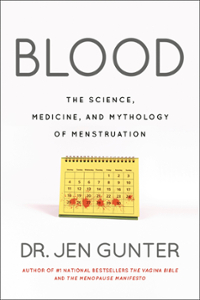Resident alum on a mission to debunk menstruation myths and misinformation

By Cynthia Fazio

It’s a natural biological process, period.
Best-selling author and board-certified OB/GYN Dr. Jen Gunter is on a mission to debunk menstruation myths and address the societal shame and stigma that continue to surround it.
Gunter, who completed her residency training in obstetrics and gynecology at Schulich School of Medicine & Dentistry, will join Dr. Sonya Malone, senior physician and acting director of Wellness & Well-Being at Western, for a conversation about her latest book, Blood: The science, medicine, and mythology of menstruation .
The event runs from 7 to 8:15 p.m. on Feb. 8 at the BMO Auditorium in the Richard Ivey Building. Tickets can be purchased online.
We connected with Gunter to discuss her book and her upcoming talk.
What can you tell us about your new book?
It’s about everything to do with the menstrual cycle – from why we have it, to why it happens (specifically the hormonal changes), why it hurts, why we bleed, when to be worried about it, how to learn about the symptoms and conditions associated with it and how to advocate. I hope the book can help empower people to advocate in the doctor’s office for themselves and navigate the minefield of misinformation online.
What led you to write about menstruation?
I had noticed an uptick in disinformation about the menstrual cycle online which coincided with false fears about the COVID vaccine affecting fertility as well as a rise in anti-hormonal contraception disinformation. These things seemed to play off each other and have a common theme related to purity culture, and purity culture tends to masquerade as wellness which is very concerning. So, I thought if more people knew about the menstrual cycle, perhaps more people would be able to resist this kind of disinformation.
How can we help tackle misinformation and reduce societal shame surrounding menstruation?
I think the first step is to use the correct terms and to not to speak in euphemism. Another is to not have shame when discussing the menstrual cycle, because when people are ashamed, they tend to go to unreliable places to get information. I also think it’s important for everybody to learn social media hygiene. For example, if they see influencers spreading misinformation, they should unfollow or block those people so they can protect themselves because repetition on social media can make people believe things that aren’t true – this is the illusory truth effect.
People should always fact check everything they hear. When you’re on social media, double-check that the information is from a reliable source. Hopefully I can be that reliable source for people and other examples are Health Canada and the Society of Obstetricians and Gynecologists of Canada.
Also, I think it’s important that we all expect our governments to do better with funding for research for menstrual-related conditions and women’s health in general, because it’s woefully under-studied.
What role can schools play to further education on menstrual health?
Instead of sexual education courses, I think this should be incorporated into biology classes because we have been teaching people about their menstrual cycles in the context of how to prevent pregnancy as opposed to this is your body, this is how it works.
School is supposed to prepare you for life and if you know very little about how your body works, then that is problematic.
How did your residency at Schulich Medicine & Dentistry shape your work?
While I was doing my residency, I had people come in and ask questions about things they had read in People Magazine or Reader’s Digest, as it wasn’t from social media back in the day. A common question was whether tampons have asbestos, which they don’t. Then, I started to wonder where people got this information and that’s how I started looking through the magazines in the waiting room and first encountered misinformation.
It’s fascinating that some of the same pieces of misinformation I heard back then are still commonly spoken about today, more than 30 years later.
What do you hope the audience will take away from the conversation on Feb. 8?
We’ll be talking about the book and all things menstrual, and hopefully people will leave knowing they can say the words. Hopefully they will walk into their local drug store and ask them to change the sign to say menstrual products instead of feminine hygiene products.
My hope is that the information in the book will help them advocate, and they will be able to get the help they need.








